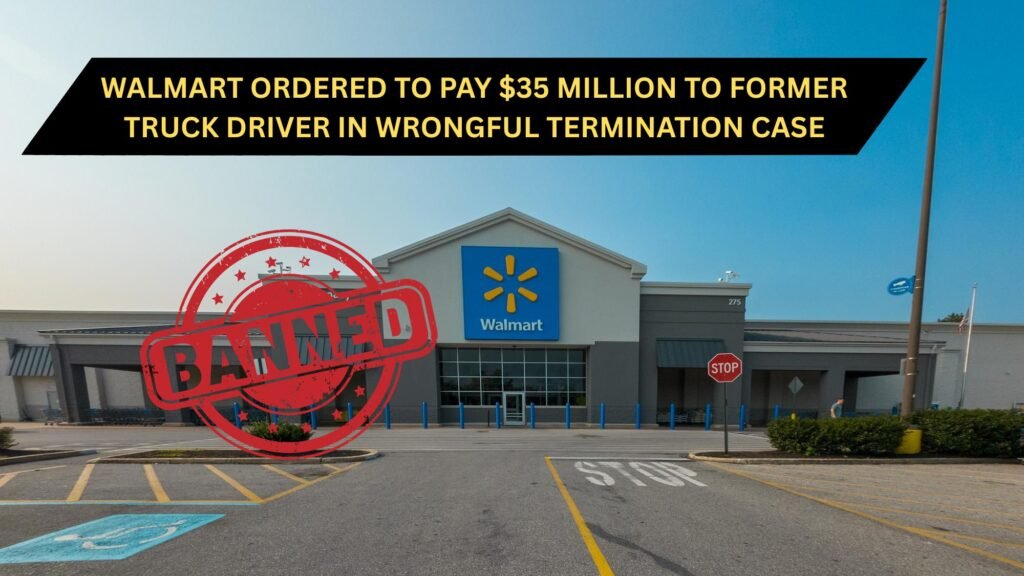A California jury delivered a groundbreaking verdict in November 2024. Walmart ordered to pay $35 million to former truck driver in wrongful termination case has set a new benchmark. The case involved Jesus “Jesse” Fonseca, a 14-year employee. This verdict represents one of the most significant employment law decisions in recent years. It combines substantial compensatory and punitive damages that send a clear message about employer accountability.
The case goes beyond the financial penalty. It highlights critical issues in workplace investigations and employee rights. Large corporations must conduct thorough internal investigations. They cannot make unsubstantiated allegations against employees. The verdict shows that employers face increasing legal accountability. This case serves as a warning to companies across the United States.
The Case Background: Jesse Fonseca’s 14-Year Career Ends in Controversy
Jesus “Jesse” Fonseca drove trucks for Walmart for 14 years. He even appeared in a national television commercial for the company. His career changed dramatically in 2017. He was involved in a rear-end collision while driving his semi-truck. The accident was not his fault. He sustained injuries and filed a workers’ compensation claim under California law.
The Medical Leave and Investigation
Fonseca’s doctors restricted his work activities after the accident. He could not drive an 18-wheeler truck for 10 to 14 hours daily. This was his primary job responsibility. During medical leave, Fonseca stayed transparent with Walmart. He informed the nurse case manager about pre-planned family trips. These included an RV camping trip and a cruise with his wife.
Walmart’s workers’ compensation administrator launched a secret investigation. They videotaped Fonseca driving the RV. They also recorded him bending, which violated his medical restrictions. The footage went to Walmart’s internal fraud investigator. Fonseca provided explanations for his activities. The fraud investigator found him credible and honest. The investigator declined to pursue criminal prosecution.
The Termination Decision
Walmart’s ethics department reached a different conclusion. They never consulted Fonseca directly. They ignored their own fraud investigator’s findings. The department determined Fonseca engaged in “intentional dishonesty.” They classified this as an integrity violation. This led to his immediate termination.
Trial testimony revealed a troubling pattern. Walmart’s ethics department had a rigid policy. They treated any activity outside medical restrictions as dishonesty. They did this regardless of actual intent or deception.
Legal Grounds for the Historic Verdict
The case of Walmart ordered to pay $35 million to former truck driver in wrongful termination case went to trial in San Bernardino County. The jury found decisively for Fonseca on multiple grounds.
Defamation Claims
The jury found Walmart’s fraud accusation was false and damaging. This met the criteria for defamation under California law. California Civil Code Sections 44-46 outline the requirements for defamation claims.
Several elements must be proven for defamation. First, someone must make a false statement of fact. Walmart falsely accused Fonseca of workers’ compensation fraud. Second, the statement must be published to others. Walmart communicated the accusation internally. This led to Fonseca’s termination and damaged his reputation.
Workers’ compensation fraud accusations are “defamation per se.” This means they impute a crime or professional incompetence. The law automatically presumes harm to reputation. The plaintiff doesn’t need to prove specific damages. The jury found Walmart acted without reasonable care. They made accusations without adequate evidence. This showed negligence or reckless disregard for the truth.
Wrongful Termination Based on Retaliation
The jury determined Walmart retaliated against Fonseca. They fired him for filing a workers’ compensation claim. California Labor Code Section 132a prohibits this conduct. Employers cannot discharge or discriminate against employees who file such claims.
The timing strongly supported the retaliation finding. Walmart terminated Fonseca after his claim and during medical leave. California law provides strong protections for injured workers. Violations can result in reinstatement and back pay. Employees may also receive increased compensation for their injuries.
Disability Discrimination
Fonseca proved Walmart failed to accommodate his disability. Federal and state laws require reasonable accommodations. The Americans with Disabilities Act covers this at the federal level. California’s Fair Employment and Housing Act provides similar protections. Employers must engage in an interactive process with disabled employees. The jury found Walmart failed these obligations.
Breaking Down the $35 Million Award
The jury awarded Fonseca nearly $35 million total. This reflected both actual harm and the need for deterrence. The award had two main components.
Compensatory Damages: The jury awarded $9.7 million in compensatory damages. This covered Fonseca’s actual losses. It included lost wages and benefits. It also covered emotional distress and reputational harm.
Punitive Damages: The jury imposed $25 million in punitive damages. These damages punish egregious conduct. They also deter similar future actions. California law allows punitive damages for malicious or reckless conduct. The employer must show willful disregard for employee rights.
The 2.5-to-1 ratio sends a strong message. The jury condemned Walmart’s conduct severely. They found more than mere negligence. Walmart showed intentional or reckless disregard for truth.
Corporate Response and the Appeals Process
Walmart immediately disputed the verdict. They called it “outrageous” and factually incorrect. The company plans to “pursue all available remedies.” This signals upcoming post-trial motions and appeals.
The appeals process could challenge multiple aspects. Walmart may dispute the evidence sufficiency. They might contest legal interpretations. The damage amounts, especially punitive damages, will likely face scrutiny. The case may continue for years through California courts.
Broader Implications for American Workplaces
Lessons for Employers
This case warns employers about investigation procedures. Companies must conduct thorough and unbiased internal investigations. Documentation must support any disciplinary actions. The jury found Walmart lacked reasonable care. They made accusations without adequate evidence. This created severe legal and financial risks.
Employers must substantiate misconduct allegations before acting. They should consult all relevant parties. This includes the accused employee and internal investigators. Walmart’s fraud investigator cleared Fonseca. Yet the ethics department terminated him anyway. This disconnect exemplifies dangerous gaps in corporate processes.
Companies need fair and consistent ethics policies. Rigid interpretations can lead to unjust outcomes. Treating any medical restriction deviation as dishonesty is problematic. Context and actual intent matter. Ignoring these factors creates significant legal exposure.
Empowerment for Employees
This verdict reinforces employee protections. Workers can file compensation claims without fear of retaliation. California Labor Code Section 132a provides strong safeguards. Many other states offer similar protections.
Employees falsely accused of misconduct have legal remedies. Defamation claims can yield significant compensation. This includes damages for reputational harm and emotional distress. Fonseca’s multi-faceted legal strategy proved successful. He combined wrongful termination, defamation, and discrimination claims. This approach maximized his potential recovery.
Research shows a clear pattern. Employees with experienced attorneys achieve better outcomes. They have higher success rates in wrongful termination cases. They also receive larger compensation awards. This verdict proves individuals can challenge large corporations successfully.
Evolution of Employment Law
The Fonseca case advances employment defamation law significantly. It sets precedent for consequences of unsubstantiated accusations. Employers must meet high standards of truthfulness. Due diligence is required in all employee-related statements.
The case demonstrates claim synergy. Employees can pursue multiple legal theories simultaneously. Wrongful termination, retaliation, and discrimination claims reinforce each other. California’s employee-friendly laws amplify potential damages. This strategy can dramatically increase recovery amounts.
This verdict continues a broader trend. Multi-million dollar employment verdicts are increasing. Courts scrutinize corporate HR practices more closely. The stakes for non-compliance keep rising. California often leads national employment law trends. This case will likely influence practices nationwide.
Conclusion
The Fonseca v. Walmart case marks a watershed moment. Employers must ensure fairness in all employment decisions. Internal investigations require accuracy and due process. The $35 million verdict sends an unmistakable message. Violations carry severe financial and reputational consequences.
Employers must reevaluate their procedures immediately. Investigation protocols need a comprehensive review. Integrity policies require careful examination. Quick HR decisions can lead to massive litigation costs. Fair and thorough practices are not optional. They are legal requirements.
Employees gain powerful validation from this verdict. The legal system can deliver substantial justice. False accusations will not go unpunished. Disability accommodation failures have consequences. Workers’ rights have meaningful protection.
The case continues through appeals. Yet its impact already resonates nationwide. Corporate boardrooms and HR departments take notice. Integrity must be more than a buzzword. It requires fair, thorough, and truthful practices. These practices must respect both employment law’s letter and the spirit.



